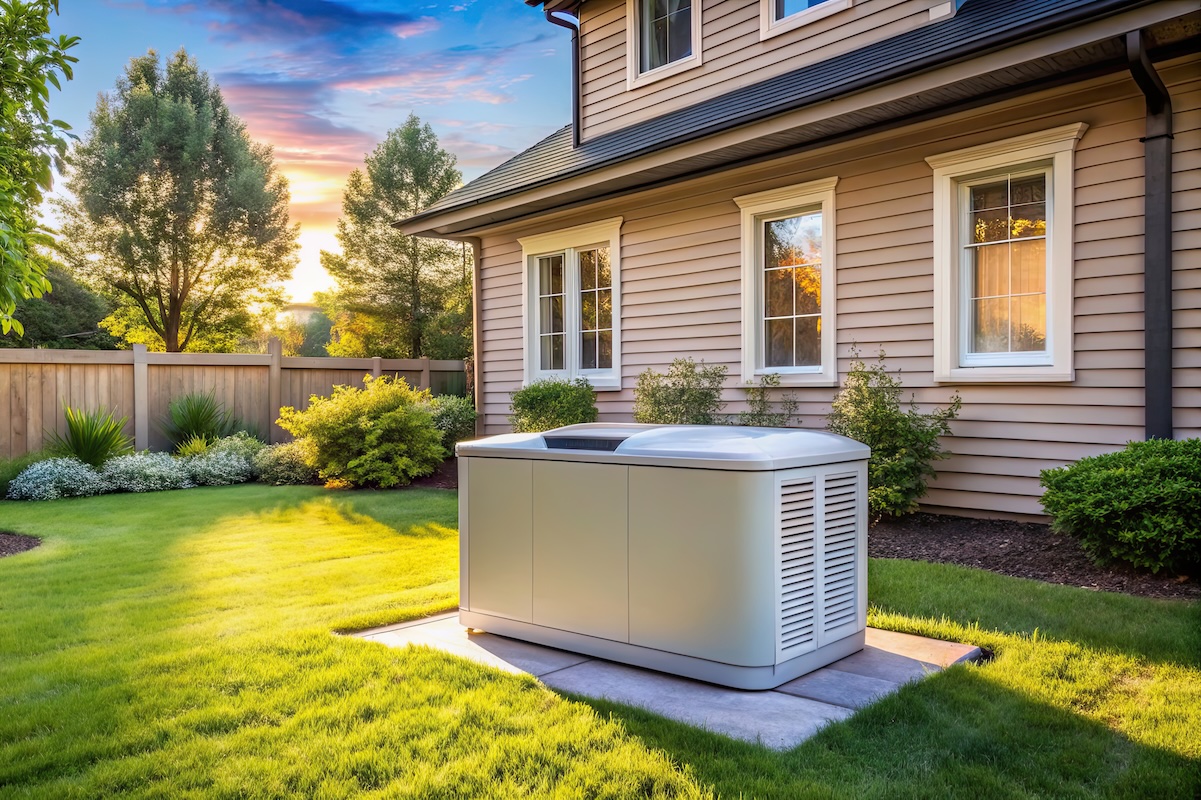
09 Oct Stay Powered: Houston’s Guide to Home Generator Installation
Installing a generator in Houston isn’t exactly the kind of project most homeowners get excited about. That is, you’re not going to see Instagram posts about someone proudly installing a transfer switch.
But when the power goes out—especially in the middle of a tropical storm—that “un-glamorous” generator suddenly becomes the most important thing you own. It’s the difference between sweating it out in the dark, staring at the spot where the candles you forgot to replace after the last storm should be, or having the AC kick back on like nothing happened.
So, while it’s not the most Instagrammable home improvement, installing a generator is one of those things you’ll be really glad you did—eventually.
If you’ve lived in Houston long enough, you know that power outages are part of life here. Between the summer thunderstorms, hurricanes, and even the occasional icy winter event that somehow catches everyone off guard, the power grid can be pretty unpredictable. The way things have been going, having whole home backup power isn’t just a luxury anymore—it’s more like a basic survival tool.
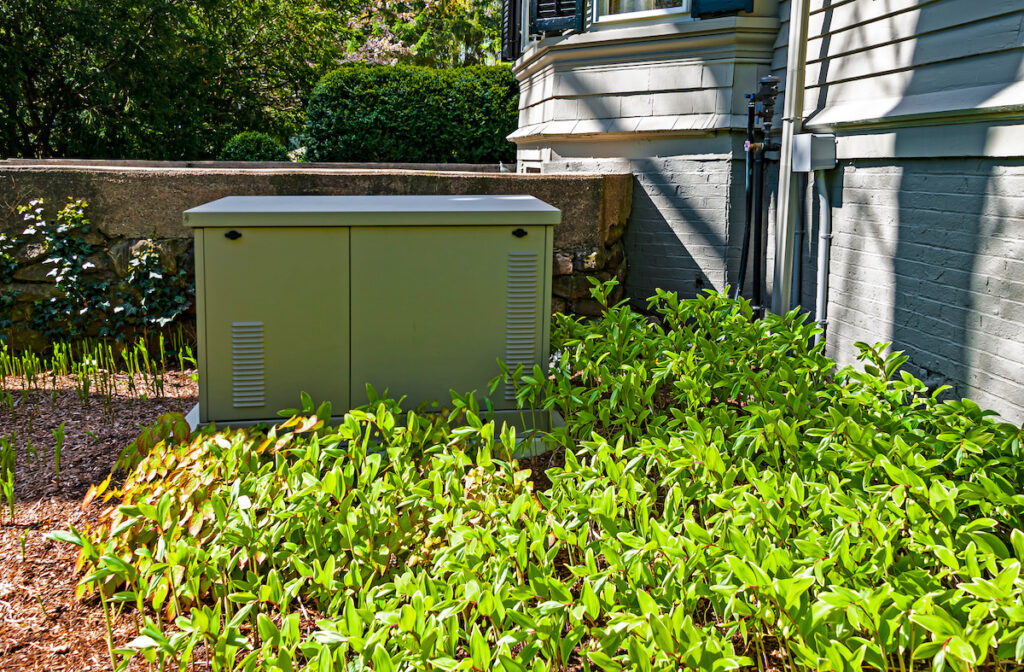
A generator can keep essential appliances running, like your fridge, AC, or medical equipment. For people with health conditions or small children, losing power can turn into a bigger issue fast. Standby generators offer peace of mind by automatically kicking in when the electricity goes out, while portable generators can be good for short-term use but require more manual work.
It doesn’t matter if you’re just trying to keep your refrigerator humming so your groceries don’t spoil, or you need to run medical equipment, a generator can be a serious lifeline during a blackout. But it’s not something you just grab off a shelf, plug in, and forget about. There’s more to it, and you want to do it right.
1. Why You Need a Generator in Houston
As you can plainly see, Houston’s weather has a mind of its own.
Tropical storms? Check.
Random flash floods? Yep.
Ice storms that freeze over highways? Occasionally, yes.
And the longer you’ve been here, the more you realize that these power outages aren’t exactly rare. If it hasn’t happened to you yet, it will.
That’s where a generator can do a world of good. A standby generator, the kind that’s installed outside your home and runs on natural gas or propane, doesn’t just give you a little backup power—it can keep your entire house running like normal.
The fridge stays cold.
The lights stay on.
The A/C keeps cooling.
Here in East Texas, where summers can make your house feel like an oven within hours of a blackout, those are all big deals.
But on top of those, here are some other examples of where a standby generator can be critical, especially for people with specific health needs or during emergencies:
- CPAP Machines for Sleep Apnea – People who rely on CPAP machines for sleep apnea need uninterrupted power to ensure they can breathe properly throughout the night. A power outage can stop the machine from working, leading to a disrupted night’s sleep or even health risks. A standby generator ensures this critical medical equipment stays operational without any manual intervention.
- Refrigeration for Insulin – For those with diabetes, insulin must be stored at a specific temperature to remain effective. In a power outage, a refrigerator without power can start warming up within hours, putting stored insulin at risk of spoiling. A standby generator will keep the refrigerator running, ensuring that insulin and other temperature-sensitive medications stay safe.
- Powering an Oxygen Concentrator – People who rely on oxygen concentrators for chronic respiratory conditions, such as COPD, need a constant source of power for their equipment. If the power goes out and there’s no backup generator, their access to oxygen could be compromised, creating a dangerous situation. A standby generator provides seamless, uninterrupted power for life-supporting devices like these.
- Maintaining Infant Formula or Breast Milk – For families with small children, especially infants, keeping formula or breast milk safely refrigerated is essential. A power outage could make it difficult to maintain proper temperatures for formula or pumped milk, which could spoil quickly. A generator ensures that refrigeration is maintained, avoiding spoilage and keeping feeding routines intact.
These scenarios show how critical uninterrupted power can be for maintaining health and safety during power outages, especially when specific medical or childcare needs are involved.
2. Types of Generators to Consider
Before you even start thinking about installation, you’ve got to figure out what kind of generator you actually need. There are two main options: standby generators and portable generators.
- Portable Generators – These are the more budget-friendly option, but they come with extra work. They run on gasoline, so you’ve got to keep fuel on hand and manually set them up when the power goes out. If you’re just looking to run a few things for a short period, they can do the job. Just don’t expect them to keep your whole house running like normal. Also, they’re loud. You’ll hear it humming from across the yard—and so will your neighbors.
- Standby Generators – These are the Cadillac of home generators. They’re permanently installed outside your house, usually running on natural gas (which is great, because who wants to store external propane tanks or gas cans in this heat?). They kick on automatically when the power goes out, and they can run for as long as you need them to—days, weeks, however long it takes for the Texas power grid to get back on track. When that power goes out and you’re the only house on the block with the lights on, you won’t be thinking about the price tag.
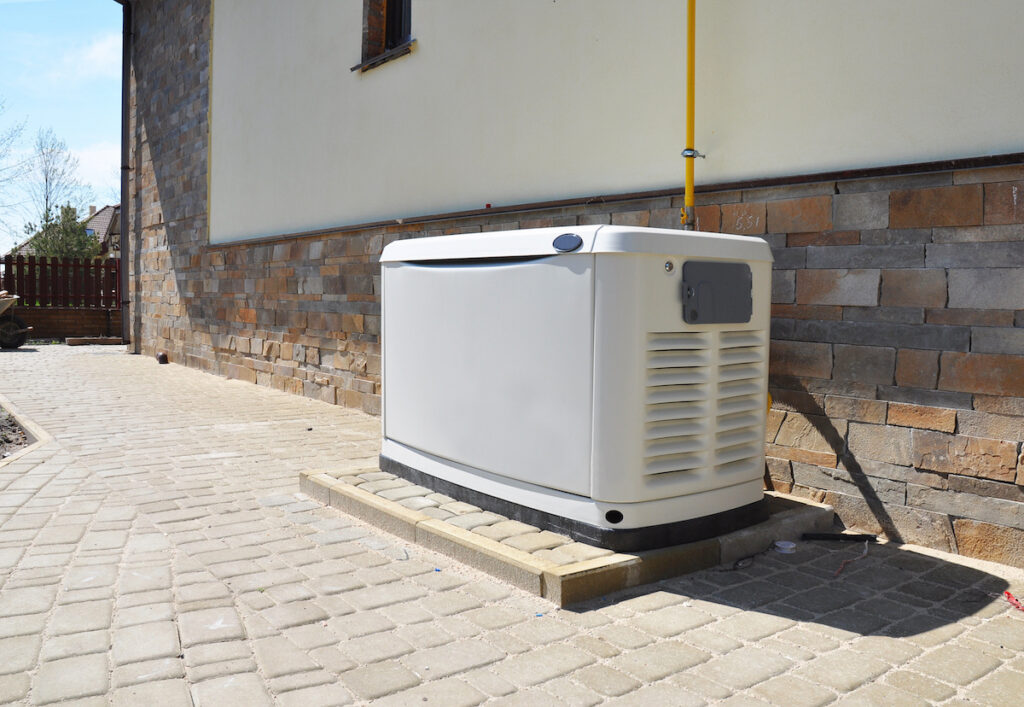
3. The Installation Process
If you’re leaning toward installing a standby generator, don’t expect this to be a weekend DIY project. Even if you’re handy around the house, Generator Installation in Houston is a serious job, and it can involve both electrical and plumbing work. Unless you’re a licensed electrician, you’ll need to hire someone who is.
The process itself starts with figuring out what size generator you need. The right size depends on how much of your house you want to keep powered when the grid goes down. Do you just want to keep the essentials like your refrigerator and a few lights running? Or are you looking to keep the whole house, including the AC and maybe even the pool pump, up and running? If you’re going for the latter, you’re probably looking at a generator in the 20 kW range, which is pretty standard for Houston homes.
You’ll also need to find a qualified installer. This part matters a lot, because a bad installation can lead to major headaches down the line, and Houston’s building codes are strict when it comes to things like electrical work and gas lines. You don’t want to cut corners here. The installer can help you figure out the best location for the generator (which, by the way, can’t be too close to your house, windows, or doors for safety reasons), get the necessary permits, and make sure everything’s up to Texas electrical code.
So again, installing a standby generator isn’t a DIY job unless you’re an experienced electrician or plumber. For most people, you’ll need to hire a professional. Here’s an overview of how the process works:
- Step 1: Choose the Right Size Generator
Generators come in different sizes, and figuring out what size generator you need for your home depends on what you want to keep running. A smaller generator might power a few essentials like your refrigerator and lights. A larger one could keep the whole house running, including the AC. Most people in Houston want to keep their AC running, so it’s common to go with at least a 20 kW generator. - Step 2: Hire a Qualified Installer
Look for a licensed electrician or contractor who specializes in generators. They’ll help you determine the right size, location, and fuel type. For Houston residents, natural gas is usually the best option because it’s reliable and already piped into most homes. - Step 3: Install a Transfer Switch
Your electrician will install a transfer switch, which is a critical piece of equipment that tells the generator when to kick on and off. It connects your home’s electrical system to the generator and makes sure that power isn’t flowing back into the grid (which is dangerous for utility workers). - Step 4: Connect the Generator to a Fuel Source
If you’re using a natural gas generator, the installer will connect it to your home’s gas line. If you’re going with propane, you’ll need a separate tank installed. This isn’t the most thrilling part of the process, but it’s important. - Step 5: Test the System
Once everything is hooked up, the installer will test the system to make sure everything works correctly. You’ll want to ask them how to maintain the generator and what to do if something goes wrong.
Pro Tips:
- An especially critical part of the installation is the transfer switch. This is what tells the generator when to turn on and off. Without it, you’d be flipping breakers or worse, risking backfeeding electricity into the grid, which could seriously injure utility workers. Your installer will set this up for you, making sure that when the power goes out, your generator knows it’s time to step in.
- Then there’s the fuel source. For most Houston homeowners, natural gas is the way to go. It’s already piped into most homes, so there’s no need to worry about refueling in the middle of a storm. If your house doesn’t have natural gas, you might have to go with propane, which requires its own tank and regular refills. It’s a bit more of a hassle, but still manageable.
4. Permits & Codes
Houston has specific permitting and code requirements for generator installation. A good contractor will handle this for you, but you should know that you’ll likely need an electrical permit and possibly a plumbing permit if you’re connecting to a gas line. The city of Houston has strict guidelines about where generators can be placed, typically away from windows and doors for safety.
5. How Much It Costs
A standby generator can cost anywhere from $3,000 to $10,000 or more, depending on the size and complexity of the installation. Labor alone usually runs between $1,500 and $5,000. Portable generators are cheaper, but you’ll need to set them up each time when the power goes out and keep extra fuel on hand.
When you add it all up, it’s not cheap, but think of it like this: what’s it worth to you to keep your home comfortable, your food cold, and your devices charged when the power goes out? In Houston, where losing AC for even a few hours can be miserable, that peace of mind might be worth the investment.
Why Standby Generators are Better Than Portables
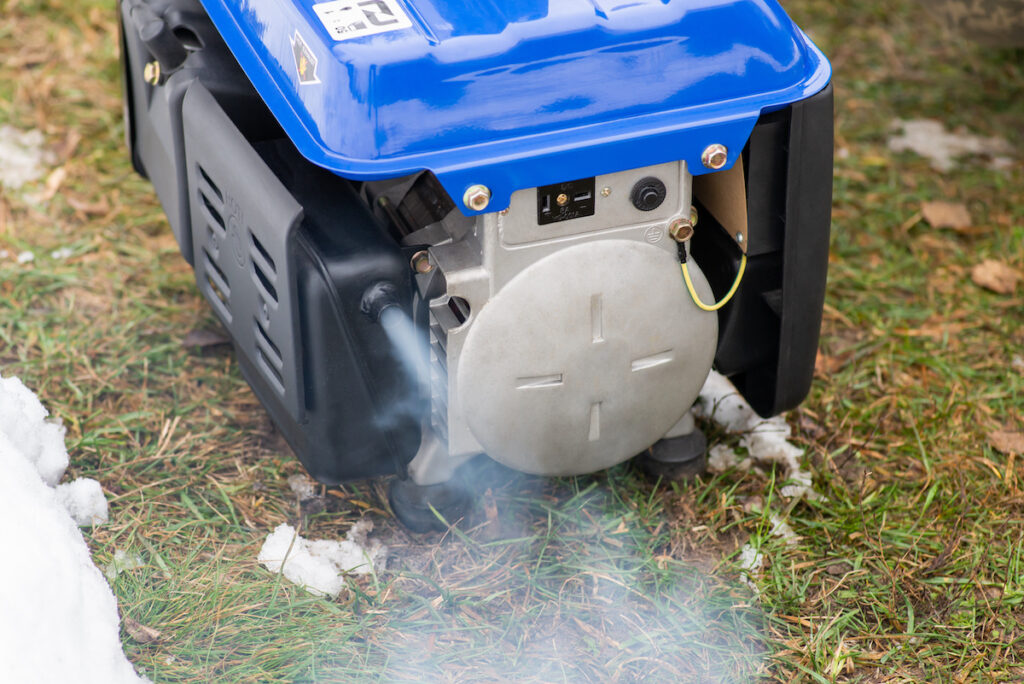
For most Houston residents, a portable generator being “cheaper” doesn’t make up for the practical headaches involved. Here’s why:
- Heat: Houston’s power outages often happen during the summer when temperatures are consistently over 90°F, with humidity that makes it feel even worse. Having to manually set up a portable generator in that kind of heat, while potentially dealing with storm damage or other emergencies, is a huge inconvenience. No one wants to be sweating buckets trying to get a generator running, especially if you’ve got small children, elderly family members, or health concerns.
- Fuel Storage: Portable generators run on gasoline, and keeping enough fuel on hand to run the generator for any length of time is a challenge. During extended outages, gas stations may not have power themselves, making it difficult to refill. And storing gasoline at home can be risky if not done properly, particularly with the extreme heat in Houston. It’s not like you can just keep a few extra gallons safely stored in your garage without it becoming a fire hazard or smelling awful.
- Manual Labor: With a portable generator, you’ll have to physically go out, set it up, connect it to your home (which involves extension cords or transfer switches), and start it every time the power goes out. You’ll also need to refuel it every few hours. This is manageable for a short outage, but during something like a hurricane, where the power can be out for days or even weeks, this becomes exhausting and impractical.
- Power Limitations: Portable generators can’t power an entire home, and in Houston, you’re going to want that AC running. Most portable units can only handle a few appliances at a time, meaning you’ll have to choose between keeping your fridge cold or running fans and lights—forget about air conditioning. For most people in Houston, living without AC, even for a few hours, is borderline unbearable.
- Maybe the Most Important Disadvantage: With a portable generator, there’s always going to be a gap between when the power goes out and when the generator starts providing electricity. You have to notice the outage, get the generator set up, and manually start it. This means you could be without power for several minutes to even hours, depending on how quickly you can get it going.
A standby generator kicks on automatically within seconds of detecting a power outage. You don’t have to lift a finger—no scrambling to set things up, no manual start. The transfer switch takes care of it, so there’s virtually no interruption in power. This is important for people who rely on uninterrupted power for medical devices or for preventing perishable goods in the fridge from spoiling.
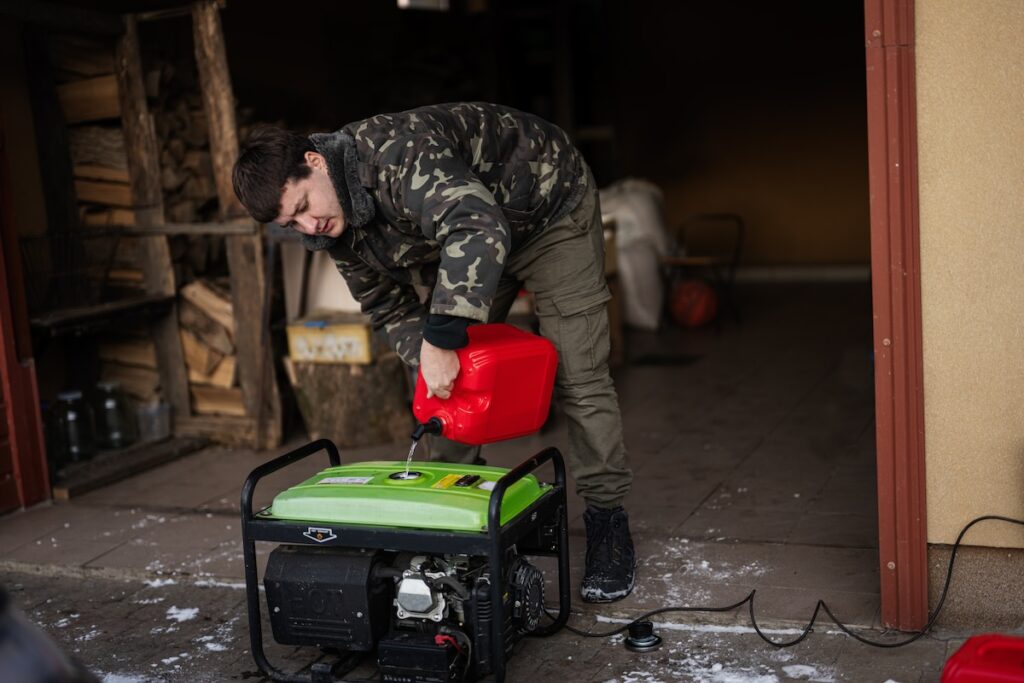
Now about that fuel storage. You might be willing to risk that out in Brenham where you’ve got a big yard to store your fuel, but in Houston, with tighter spaces and the heat? No way. we’ve got enough to worry about without adding some extra cans of extra gasoline sitting in our garages.
Most standby generators in Houston run on natural gas, which is already piped into your home. It’s the same gas that fuels your stove or water heater, and because it’s coming from a continuous supply line underground, you don’t have to store it or refill it like you would with gasoline for a portable generator. This eliminates the need to keep volatile fuel in your garage or backyard.
(It’s also far more convenient—no running out to gas stations that might be closed or out of fuel themselves during a major power outage, which happens pretty often during big storms here.)
So, while portable generators might be cheaper up front, for most Houston residents, the hassle, heat, and limitations make them a poor option compared to a standby generator that automatically turns on, runs off natural gas, and can power the whole house.
6. Maintenance and Upkeep
Like any major piece of equipment, generators require maintenance. Standby generators typically need an oil change every 200 hours of use and a yearly check-up to ensure they’re ready to go when needed. Make sure you know where the air filter is and how to check the oil. You don’t want to be fumbling around during an emergency. Our East Texas summers can be brutal, and you’ll want your AC back on ASAP if the power goes out.
7. Finding a Good Installer
Finding a good installer is one of those things that seems easy until you’re actually doing it. Sure, a quick Google search will throw a dozen names at you, but that’s where the easy part ends. You don’t want just anyone tinkering around with your power supply. You need someone local, reputable, and who has done this more than once—because this isn’t the type of job where you want to be the guinea pig for a contractor who’s still getting the hang of things.
Ask around for recommendations, check reviews, and make sure they’re licensed and insured. Generators are becoming more common with every storm season, so chances are, somebody you know has a recommendation. A professional installer should offer a consultation to assess your needs and provide a quote.
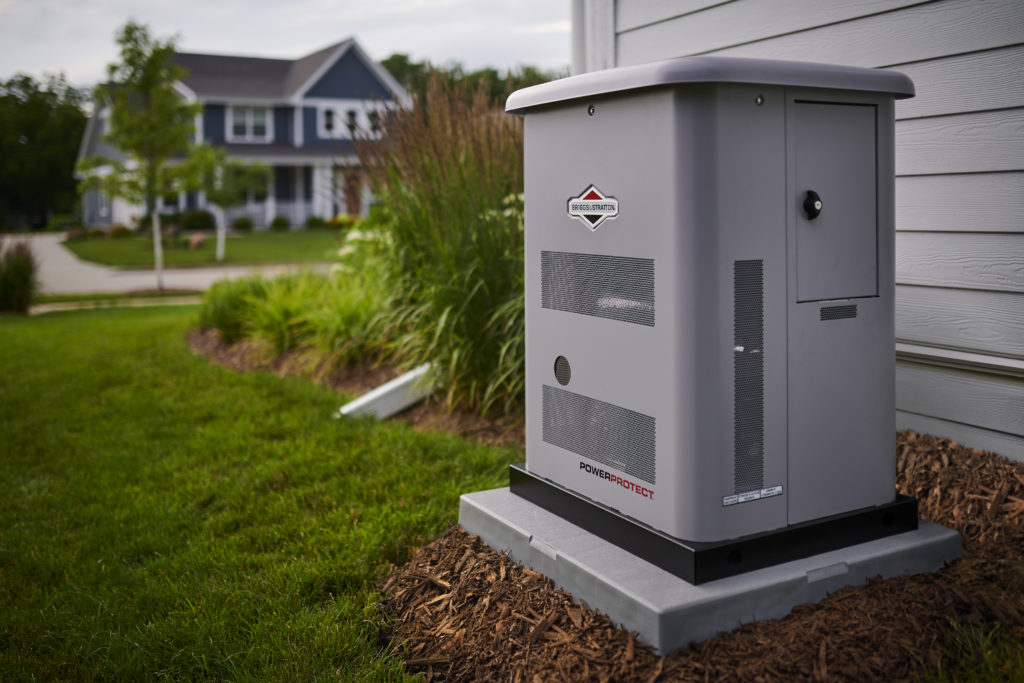
Another thing to watch out for: a good Houston generator installer isn’t going to rush you. They’ll take the time to talk through your needs, assess your home, and give you a quote based on that. You’re not buying a toaster—you’re making a significant investment in something that’s supposed to keep your home running during an emergency.
A professional will do a proper consultation, look at your home’s electrical system, figure out the best placement for the generator, and then give you a realistic quote. If someone’s trying to sell you on a generator without even coming out to look at your house, they’re not taking your needs seriously.
Final Thoughts
Having a generator in Houston isn’t just about convenience—it’s a smart move for dealing with our city’s unpredictable weather. Whether you’re opting for a permanent standby generator or a more affordable portable one, the key is proper installation and maintenance. Hire a professional, get the right permits, and ensure your setup is ready before the next storm hits. You’ll thank yourself the next time the power goes out and you’re sitting comfortably with the lights on while everyone else is sweating it out.
Houston Generator Installation
At Brotherly Love Electric, we’ve got your back with Briggs & Stratton standby generators, available in a range of sizes to fit your home or business needs. Whether you’re in The Woodlands, Katy, Sugarland, or anywhere in between, our family-owned team will help you figure out the right generator to keep your lights on and your AC running—because we know how brutal a Houston summer can get without power.
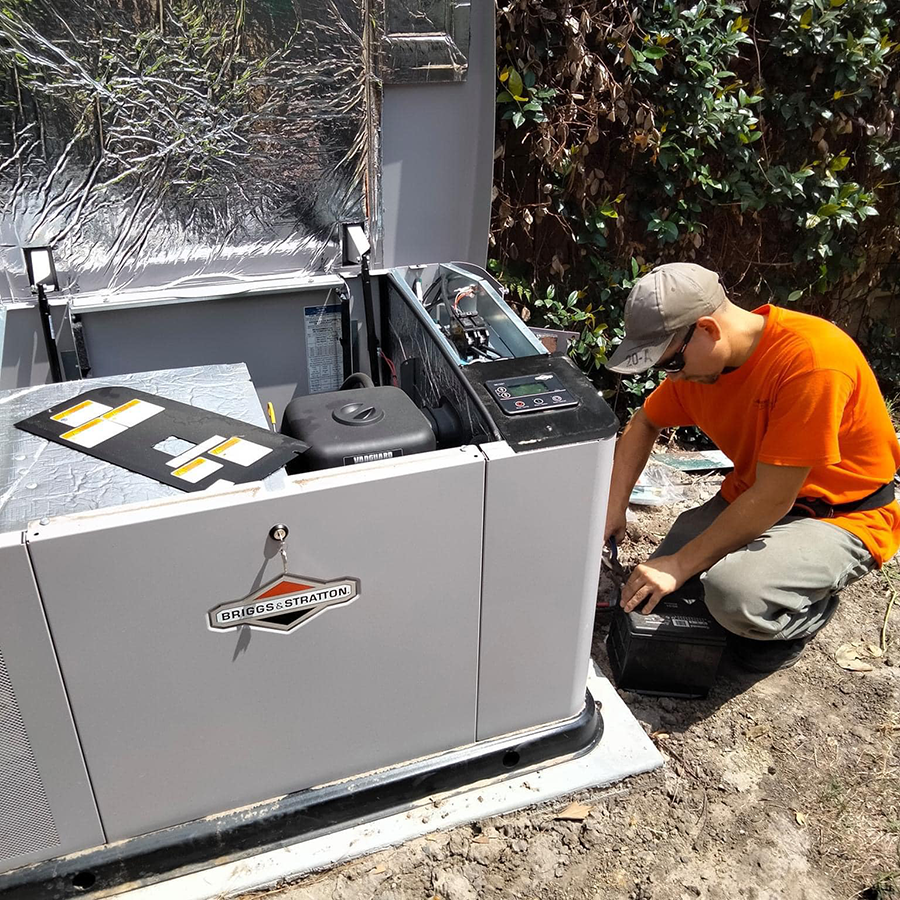
We’re local, family-owned, and we take safety seriously. Whether it’s new construction, renovations, residential, industrial, or commercial work, we handle it all. When you need an electrician, you want a connection you can trust, and that’s exactly what you’ll get with us.
Let our experienced electricians come out and give you a free estimate on the best whole-home generator for your space. No gimmicks, no pressure—just honest service.
We’re proud to serve Houston, The Woodlands, Cypress, Spring, and beyond—keeping your home powered is what we do best. Request your free estimate today.

